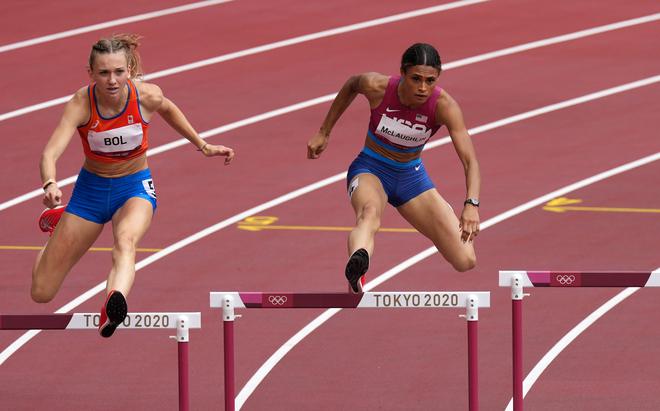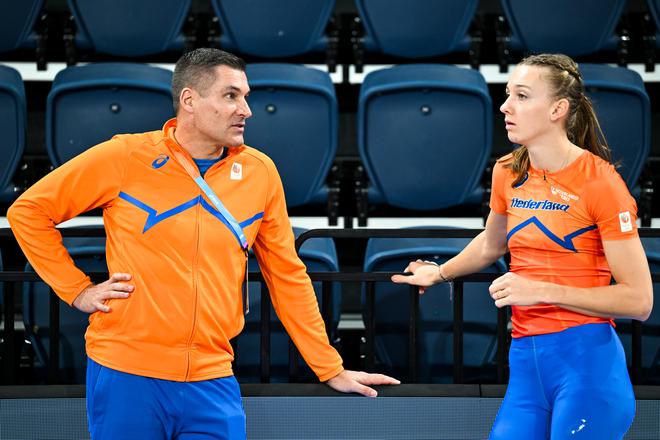After Femke Bol bettered her own world record to win the 400m in a dominant display of gun-to-tape running at last weekend’s World Athletics Indoor championships, she said, “Last year I ran a world record and now I’ve done it again. Isn’t it good enough yet?”
There is no doubt that Bol is an elite athlete — ordinarily, her world-beating achievements, in both the 400m flat and her favourite event, the 400m hurdles, are significantly better than “good enough”. It’s just that she happens to be chasing Sydney McLaughlin-Levrone, widely regarded as the greatest 400m hurdler of all time, and so Bol never quite knows if she is “good enough”.
Dealing with reality
As Bol once said of her pursuit of McLaughlin-Levrone, “Of course, you want to be the best, but it’s cool to be able to race Sydney, the best ever, and try one day to beat that person — perhaps never. Perhaps I will be second on the world stage my whole career, but I’m training not to be.”
Just to be clear, Bol has already won several major gold medals.
She is the reigning 400m hurdles world champion, winning easily in Budapest last year in McLaughlin-Levrone’s absence. At the same event, she also anchored the Netherlands team in the 4x400m relay for her second Worlds gold.
Bol completed a stunning European double in 2022, winning the 400m flat before dominating the 400m hurdles. She also has three Diamond League crowns in the 400m hurdles.

But the 24-year-old has not beaten McLaughlin-Levrone in the 400m hurdles, finishing behind the American at both the Tokyo Olympics in 2021 and the 2022 World Championships. While the Olympic bronze was an encouraging result for a 21-year-old Bol — both McLaughlin-Levrone and Dalilah Muhammad were more advanced athletes at that stage — the 2022 Worlds silver was deflating. Bol beat her idol Muhammad (bronze), but was trounced by 1.59 seconds!
“It was crazy,” Bol said. “Sydney was so far in front at the end, I was almost doubting if I really had a good race. Then, I saw the time and I thought, ‘Wow, that explains a lot.’” The time was 50.68 seconds, the only ever instance of a woman going under 51 seconds in the 400m hurdles — it’s the benchmark the Dutch athlete has been working towards ever since.
Bol has got within range. She is the second-fastest woman ever in the 400m hurdles, her 51.45 seconds at last year’s London Athletics meet bettered only by McLaughlin-Levrone, who, in addition to the world record, also ran a 51.41 at the USATF Championships in 2022.
Sending a message
It is in this context that Bol’s recent indoor world record in Glasgow assumes significance. The specialist hurdler sought a pre-Paris Games workout over the 400m flat and ended up sending a warning to hurdles rivals, McLaughlin-Levrone included, for this summer’s Olympics.
Unmistakable with her upright running gait and long stride, the 6’0” Bol bettered her own indoor 400m world record to 49.17 seconds and, for good measure, added the 4x400m indoor gold to her burgeoning medal collection with an eye-catching anchor leg.
“I always run with my heart, I see what my legs give me [that day],” she said. “With two races in the legs it’s something to feel extra proud of. This is great because I’ve not done hurdles for four weeks and it gives me confidence. [But] I am missing the hurdles.”
Bol can now turn her focus to the 400m hurdles and a potential showdown with McLaughlin-Levrone in Paris, secure in the knowledge that she is a far better athlete — both mentally and technically — than she was when she last ran against the American.
The improvement in mentality was precipitated by a heartbreaking incident at the World Championships last year; the advancement of technique was born from a risky decision to restructure a fundamental aspect of her method, the stride pattern.
When Bol tumbled and fell, with the finish line steps away, in the mixed 4x400m relay at Budapest last year, she was distraught. Forced to recover quickly because she still had the 400m hurdles and the 4x400m relay to run at the meet, she rose to meet the pressure.
Bol stormed to gold in both events, showing that she could bounce back from adversity and handle the stress of being the favourite on the big stage (McLaughlin-Levrone had skipped her title defence to focus on the 400m before pulling out with an injury).
“It gave me fire,” she told Citius Mag about her fall. “And it also gave me a bit of scared emotions. But I could handle it, [telling myself]: ‘You’ve had such a good year. You’re so strong. You’re not gonna let one really, really bad moment screw up this whole tournament.’”
Reinventing her method
Bol’s courage was also evident in her decision to rewire her stride pattern, forcing her, in effect, to relearn her speciality. Bol had run with 15 strides between hurdles, but both her coach, Laurent Meuwly, and she felt that the method had hit its ceiling.

“She had run her best time in Tokyo,” Meuwly told Athletics Weekly last year, of Bol’s bronze-clinching 52.03 at the Olympics. “She [got] better physically [after that] but couldn’t improve her time. We both realised we were at the end of this concept with the 15 steps.”
Bol decided to emulate McLaughlin-Levrone’s stride-pattern, perhaps reasoning that if you have to catch the GOAT, you must first run like her. The new method entailed 14 strides between the first seven hurdles and then 15 between the final three to maximise her finishing speed.
“Progressively we pushed her stride a bit more and changed to having a more cruising way of running the first 200m, with longer strides. It’s about a 12cm difference in stride length,” Meuwly told Athletics Weekly.
“And then to change after seven hurdles to go to 15 — that was something completely different. But, very quickly, she realised in training that this was the direction to go in. [With] big changes, you need to adapt in a very short time to stay competitive at that level. That is the most difficult.”
But Bol has managed the change and emerged faster. But is it fast enough to beat McLaughlin-Levrone? “It’ll be hard to compete with her, but I hope to be close,” Bol said after her successful outing in Glasgow recently. “Hopefully she will bring the best out of me. It’s always amazing to race with Sydney because she is the best-ever in hurdles. I love to race, I love to compete against the best. My body is telling me to do this.”







